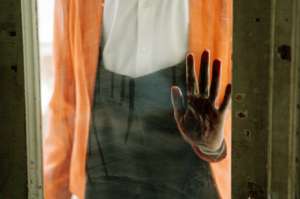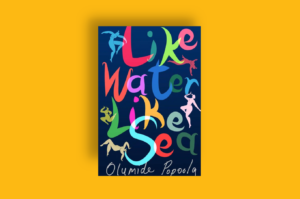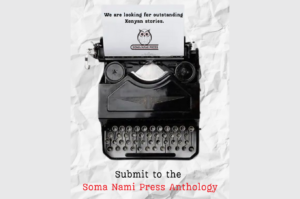
I
A little over a year ago, I put words to a thought I had after reading a clutch of essays online. All of these essays were written by Nigerians, all of whom were published by the American literary magazine Catapult. Permit me to quote those words:
The other day someone said Oris is “the one man” who can write “an epilogue about a common mosquito bite”. I laughed. Perhaps he meant an epistle but he has a point. It’s a skill, I think, writing a mid-length piece on stuff.
How do you write about something as mundane as a kiss, as an insect bite, at some length, and make it entertaining [to read without] padding your sentences with fluff? It takes some thinking, some style, and a [sensibility], but I suppose it can be learned.
John Updike said his mission was to “give the mundane its beautiful due”. I think about that often. How can one give the Nigerian mundane its due?
It’s a tricky thing considering the way we are programmed to think only suffering is worthy of writing, of literature. It’s why I wonder about the truckload of young Nigerians published by Catapult. If those pieces are an exclusive measure of the people, then, by Jove, we are all faulty humans. Witchcraft, sexual abuse, death, gay persecution, culture shock, violence, more deaths. Trauma, trauma, trauma. Such slim thematic pickings for such a large country.
This isn’t poverty porn but it is poverty of the imagination if, as young people and young Nigerian writers, we believe trauma via sentimentality is the sole prose-path to publication. The folks writing funny stories about the Lagos danfo only do it on Facebook. Give a Facebook Writer a real platform and, rather than write better sentences, she’ll probably go for the Grand Sad Story.
As a reader, I’d like to read some good Nigerian writing about your pain, yes, but also about traumatic mosquito bites and danfos and roasted plantain and spurned love and suya in respectable publications. If you insist on exclusive trauma-trafficking and mournful prose, be reminded that you’ll have too much time to be sober when you’re old. And, certainly, your lives aren’t only about trauma if you can afford data to come on Facebook day after day. Come on, people, can some tackle war and tragedy and the bleakness of the Nigerian condition, but can some do differently? Could one person do both? How else do your readers have a fuller sense of how we live now?
It’s like that line I saw on Twitter, “If you write well you don’t have to dress funny.” You could but you don’t have to. Here’s another in that same spirit: If you write well, you don’t have to by-force your trauma. You don’t have to pimp your tragedies. You could, but that’ll be by choice.
So, yes, I’ll someday write about losing my best friend in secondary school as a teenager. But that doesn’t mean I don’t want you to come closer; let me write you an “epilogue” about an episode from a fortnight ago. It was a fine evening until a blood-bloated mosquito bit my relatively impoverished forearm. . . .
I expected that persons who had gotten into Catapult would be displeased. They were—as were their friends, fans, and, presumably, family. Most of these people are my Friends online; some know me outside of the Internet. There were curses and subs, as insults directed at you but not explicitly are called on social media. I saw some of these insults; the ones I missed were conveyed to me by persons who could reach me offline. As I later learned, the whole thing formed fodder for the literary mill on WhatsApp, Instagram, and whatever other platforms writers gather on.
Reactions to such a thing are fair game for anyone interested in the literary scene, but even if the words were there on Twitter and Facebook for anyone to read, some half-true interpretation began to dominate the conversation. It seemed that for some of the readers of my complaint I was interested only in joyful, joyful stories written in good prose. But only the latter part of that thought was and remains true: I insist on good prose, the basis of which is a good sentence.
As for the idea of joyful, joyful stories, it is clear and yet puzzling how that conclusion was gotten to given that I wrote about wanting the full range of what it is to be human and Nigerian in this time. I wanted to see more essays about the way we live now.
II
I am a sucker for a great sentence. Its musicality, its clarity, the pleasure it can give. A story or piece of writing can produce pleasures outside of how its words are arranged and I have enjoyed a number of such stories—but I am heavily in favour of writing that shows it thinks about its thoughts and turns as much as it holds rapture within its arrangement of words and sentences. And over the years, I have campaigned online about this idea so much that it is what many persons mention when we meet in real life.
This unwavering belief in the primacy of the sentence has given some of my critics some ammunition which they are all too eager to use, yet I am convinced still that an ability to write a decent sentence lies at the heart of all good prose. I started a writing workshop with this as motivation: To elevate Nigerian writing in any space—literature, business, journalism, advertising, law, governance—it is important we recognise the place of the sentence. This means I welcome the traumatic, the joyful, joyful, and the mundane—but written in good prose, which could have many forms.
(Inevitably, the question that arises is this: What is good prose to you, Oris? It is a question that I myself have asked a few times. I have no definitions to give here but let’s say I like to read a piece of prose that has no extra sentence over what is needed, and those sentences contain no superfluous words. It is perhaps minimalist but it is also musical. Of course, other things like context, momentum, humour, clarity, euphony, and logic are just as important. A decent piece of writing has more than one thing in its favour.)
My interest in welcoming everything was elided and replaced with gossip concerning Oris: bully, tyrant, censor. It should be noted that it was a commentary or short essay I put up online, not an edict, but apparently, I was using whatever literary clout I possess to gag writers.
Perhaps the problem was timing: I had posted my complaint during the Catapult boom and wasn’t to be forgiven for pointing out a thing some persons might have mulled over in the quiet of their rooms or over drinks with friends.
Perhaps the problem was not mentioning names. The homogeneity of several Catapult stories and their inert prose had ticked me off, but there were exceptions. As has been confirmed time and again, a gifted writer who cares about her writing can transform the most cliched of stories into something worthwhile. For example, although it fits snugly with my complaint, Tola Rotimi’s “We Need to Talk About Snails” is a fine piece. One of its sentences—“Family is everyone’s first war”—had both euphony and the ring of truth. There is sincere melancholy in Socrates Mbamalu’s “Scarred,” about growing up with a scar on his head, that I think is hard to produce on the page. Unlike Rotimi, who said nothing maybe because she isn’t very active on social media, Mbamalu tweeted a harsh response to my complaint.
I understood Mbamalu’s position, but not mentioning names was intentional. It was a decision I took to, as the line goes, “protect the innocent,” but then it managed to piss them off, too. One of the writers I didn’t piss off completely told me, in private conversation, that she didn’t send a piece to Catapult because of my complaint. This was unsettling: in a country where writers can hardly make a living, I might have taken out the possibility of getting a few hundred dollars from this writer. When that piece later got published by Catapult, I felt some relief.
Among the displeased persons were some writers who have written about being queer. If they thought I was after them, I wasn’t. But it is understandable that certain things are hard to let go of if you are persecuted frequently: far as you know, everybody is an enemy until proven to be different. I am no enemy, but clearly my complaint didn’t make me out to be a friend. Sadly, the resentment has lingered long enough among some members of the community for someone to point me to a piece from a few months ago by a particular writer who makes an oblique reference to what I wrote all those months ago.
I have to say I had never thought highly of this particular writer’s prose mostly because I get the sense that he is too invested in sensation to care sufficiently for his sentences. This has given him some notoriety, which, I guess, is useful in today’s world of clever marketing. Reading his piece, I realized that like many others, he too had taken my call for multiplicity as a decree against trauma in Nigerian prose. But unlike a few of them, and because of his predilection for sensation, he might not have genuinely misunderstood my complaint—or maybe I just can’t extend the benefit of the doubt to him. Thankfully, his prose, this time, was passable. It is not my intention to contest each of his statements about what he believes are my own methods and thoughts about writing, but it should be enough to say that his penchant for controversy pips his capacity for comprehension. To all these, I shall add that to fully convey a queer person’s humanity in writing, joy should also receive attention.
But I recognise that there are fewer incentives to create a literature of joy for the Nigerian writer, regardless of her sexual orientation. As is frequently said, happiness writes white. I should add a few more words: especially if you are African and looking to the West for succour—as you should. The game, as they say, is the game, and in today’s version of the game, the late Binyavanga Wainaina’s counsel in “How to Write About Africa”—avoid “taboo subjects” like “ordinary domestic scenes, love between Africans (unless a death is involved), references to African writers or intellectuals, mention of school-going children who are not suffering from yaws or Ebola fever or female genital mutilation”—has been stripped of its satirical intent by writers from his own continent.
III
Part of the problem of the young Nigerian writer is the underdevelopment of Nigerian readership. We know now that Nigerians read; we may have always known. The trouble is that this readership isn’t really for what is called literary writing.
For most Nigerians looking at English writing of that sort, the lesson that your readership is in the West must be learned early. And maybe not just your readers; the reputable literary magazines, your publisher, a decent distribution network—all are outside of your borders. If you have made the mistake of thinking of earning a livelihood, you need a prize, and all the major prizes are outside of the country. You would find the same situation in Nigerian journalism, a scene where reporting the horrid and humourless—and Nigeria has a lot of them—is a blood sport for anyone looking to make money requiring a bureau de change before use locally.
This produces a political problem. We are forced to think in movements because we have been othered. The West might produce stories and writers of vastly different concerns in any given generation, within longlists, within shortlists, within prize-winners’ lists, but successful Nigerian writers and Nigerian writing are commonly and easily grouped. To simplify and elide overlapping themes here and there: first came those against the erosion of traditions by the white man; then those against military dictatorship; then the poverty porn purveyors; then the immigrant story group. The nonfiction boom it appears we are in the middle of is characterised by an individual narrative punctuated with trauma. As with the Caine Prize highlighting stories that later got grouped and called poverty porn, Catapult’s publishing of stories featuring Nigerian trauma gave birth to similar stories. Yet I can’t say this was entirely caused by the machinery of the West or without Nigerian complicity. I say this because I, too, got published by Catapult. Part of it was out of curiosity; the other bit came down to needing a platform for thoughts I had held onto for some time.
I had been thinking about the interaction between writers of different generations and geographies: what emotions were aroused, what atmosphere was created, what got said, what went unsaid. I finally got the spur to put down these thoughts after I found a sentence in The New York Times concerning writers meeting writers. That sentence ended up as the essay’s epigraph. And because a large part of it concerned meeting the writer Petina Gappah in Switzerland, the essay itself became the third part of what I sometimes call a European Trilogy.
When I had a draft of this quasi-travel essay ready, I pitched it to an editor at Catapult with a ridiculous face-saving plan preinstalled in my head: If the piece was rejected, I would console myself with thinking it a confirmation of the West’s bias for Tragic Nigeria; if it was accepted, I’d accept payment. It was silly but there is a method to the sadness: To deal with rejection, a writer must invent her own amulets.
Well, the piece was accepted and speedily, too. And while I can’t say I was wholly convinced about the West and its African writing politics, something about the process told me that maybe there is more than just Western appetite for Nigerian pain to blame for our curious case.
I agree that my method, as outlined above, is unscientific, but it seems to me unarguable that the White-Savior Industrial Complex, articulated in Teju Cole’s seminal essay, has given rise to the African Victim Industry, with the Nigerian Trauma Literary Centre as a major subsidiary, and even if the most egregious display of the first has passed, the worst of the latter pair would remain. We might ask: If there are no African persons to save and the beloved white saviour is out of work, how shall we live? How shall we write?
This proves true politically and culturally: its literary effect is one part of a story that has the Berlin-born company Jumia become one of the largest e-commerce platforms in Africa; it’s also responsible for a new rise of the East that has seen the African Union headquarters constructed with Chinese funds. Where there’s a saviour, look around, there is an African nearby.
Some of the angry responses to my complaint gave me the idea that if there were no white persons to save Nigeria, Nigerian writers would have created them. It is a peculiar Stockholm Syndrome that involves the white kidnapper demanding a type of story as ransom but even when she becomes tired of consuming such tales, the kidnapped Nigerian, like an impaired Scheherazade, would offer a thousand more. The West accepts these stories because it bolsters its own ideas of superiority. Why should it stop its production? That should be up to us.
Teju Cole indicts this superiority in the aforementioned essay, writing that “a nobody from America or Europe can go to Africa and become a godlike saviour or, at the very least, have his or her emotional needs satisfied.”
There is indeed that sort of white person. But I have also thought about the irony of Cole writing that line from some Western haven, and if the crux of his statement is compressed to the writing space, one would have to be quite aware that a chunk of his literary capital is derived both from his brilliance and from his publishing in white spaces: The New Yorker, founded in 1925 by a white man, has never had a black man as editor; The Atlantic has Francis H. Underwood, Harriet Beecher Stowe and Ralph Waldo Emerson as its founders; for over a century, The New York Times has been under control of the Ochs-Sulzberger family. Cole, clearly, is no Victim, but then Cole is also American.
Not that Cole is alone. Nigeria’s two greatest literary icons, Chinua Achebe and Wole Soyinka, have their own Western connections. Achebe’s most celebrated book was published by a white establishment; he taught and lectured at many such establishments. Soyinka would still be acknowledged as a major writer of outrageous talent, but the country owes his status as a global icon to the Nobel Prize, an honour based on the wishes of a Swedish chemist and businessman.
It is into this Western space that today’s Nigerian writer wants herself inserted.
How can I, in good faith, fault this ambition, regardless of story? Aren’t we encouraged to make it, to be ambitious? Isn’t getting into Teju Cole’s haven the exact picture of success? Who cares if in doing so some white godlike saviour gets an emotional need satisfied—if, as a result, a Nigerian writer with a real financial need is sated?
This misalignment is unavoidable. On the one hand, I am indignant at the existence of the white saviour complex and its storytelling enablers; on the other, I’m irritated that the stories, especially in nonfiction, are based on something true, and that writers will do what they can to get published—if only because Nigerian writers have come to realise that their country has created contemporary culture icons in only two spaces: pop music and Nollywood cinema. Everyone else has needed a white helping hand. If you are a successful singing or acting Nigerian, white endorsement is a bonus. If you are a writing Nigerian, white assistance is an imperative for success.
Nobody is going to change the situation, not even the government. In fact, a recent indication of the thinking at that level came in the first few weeks of May when Nigeria, through its Central Bank, announced a Creative Industry Financing Initiative. A naïve observer would assume the project document should mention books. No luck there. The initiative’s “four pillars” are fashion, information technology, cinema, and music. You could argue that one of the cornerstones of creativity is books, and that almost anything related to creative production has some writing enfolded in its process—but the Nigerian government disagrees. The shoddily written project document announcing the initiative is the Central Bank of Nigeria’s own example of how important the country considers writing.
IV
On Twitter not long ago, a clip showing Toni Morrison probing an interviewer’s question went viral. She tells the interviewer that if to stand tall someone else must be on their knees, then there is a problem.
It is a great soundbite begging for complication: What if there is more to gain from kneeling? There might be dignity in standing tall but most grocery stores would take cash. So, when my complaint attracted insults, I understood that for many Nigerian writers there is too little profit to be gained from insisting on being equal with their Western counterparts by providing stories that showcase a complex humanity. If the goal is to get published in the West and African misery travels west quite well, then a writer from Nigeria knows what to do. The hustle, you see, is the hustle. And good prose often appears tangential to these concerns. It begins to seem like what is important is some African form of anthropology, something to be prodded at by the West while the Nigerian is happy to play dead or heavily ravaged. As Thomas Chatterton Williams has said, “a lot of people engage with a victim identity out of a sense of empowerment.”
But what does this empowerment lead to for a Nigerian writer?
Getting published is the point, usually, but it doesn’t quite end there. There is the small matter of media attention and reviews once a book comes out. Which mainstream Nigerian platform demonstrates a commitment to books not written by politicians or celebrities? If they exist, they are too few and the quality of their commentary leaves much to be desired. Once again, the Western machinery for books, even now, trumps anything that currently exists in Nigeria. But Western book coverage has its own politics.
For readers like me, it is impossible to not notice that it is a rare review from the west that spends inches discussing an African writer’s approach to prose, to her sentences. When, recently, I came across the word “unadorned” in a New York Times’ review describing Sally Rooney’s prose, I recalled I had seen the same word in a review of a Nigerian novel by the same publication. I did a bit of a search and it turned out that the novel was Elnathan John’s Born on a Tuesday, which was described as written in “a style that is as unadorned as it is unflinching.” Finally, some equality, I might have thought, but no—the parsing of prose ends there and it is then reviewed like a piece of terrorist reportage, with the conclusion that:
Born on a Tuesday brings home the reality of what is happening in northern Nigeria with a power the news reports of Boko Haram’s atrocities can’t adequately project.
Makes you wonder: Is Born on a Tuesday a work of fiction or just some elaborate humanitarian report? Meanwhile, here is a paragraph from the review of Rooney’s second novel, Normal People. Her unadorned prose is not left unexamined:
Much more so than in her first novel, the clarity of Rooney’s language gives way to clichés and not terribly convincing similes (“Marianne’s face looked bright like a light bulb”; “the heat beats down on the back of Connell’s neck like the feeling of human eyes staring”), as though the urgency of writing the story were so great that she was reluctant to pause to find the more perfect phrase.
This random example is representative of how the Nigerian book can be only one thing or a thing and a half, whereas work by a Western author gets treated like a complex product of story, politics, and prose style. To be frank, the Nigerian writer and her minders would have no grounds to complain—after all, what is not yours is not yours and The New York Times is not yours.
The problem is that the unpublished Nigerian writer sees how a book about an uneducated boy living in a troubled region gets into The New York Times Book Review and wants same for himself. He would notice that the book’s prose is not discussed. How to go about getting into the NYT if not by writing something similar? This is how the current paradigm is perpetuated. It is easier to neglect writing sentences as good as can be if, in the end, your prose doesn’t quite matter to readers and esteemed critics.
Still, there is no good reason to blame a Nigerian writer who understands how these things work and is eager to take this route to success because no writer looks the gift of a New York Times review in the mouth—if only because, back home, all she’d get is an Instagram post probably gushing about the book cover. Not even the phenomenally successful books of Chimamanda Ngozi Adichie have received more than a handful of well-written, well-considered mainstream reviews in her own country. The writing is on the wall: Head West, preferably on your traumatised knees.
Thus, this agreement between the kneeling Nigerian writer and the strutting West is attributable to a failure of the literary super-structure. Nigerian publishing is a tricky manoeuvre for the aspiring author who can’t pay for the luxury; there is no real national distribution for books; no one knows if there’s sufficient demand for those books; the Nigerian academia is more invested in the classics or in selling its own poorly written “literature”; serious popular reviewing of books is dead. Go West or go home.
V
And yet, I stand by my call for multiplicity. The way I see it, there is only so much egusi one can take before craving a different soup. The Western appetite for Nigerian trauma will perhaps never be sated but maybe it would accept a varied thematic diet. Unfortunately, I can’t be as optimistic about Nigerian publishing. There are more people willing to head West than to bother about publishing. The book business might be bad everywhere but Nigerian writers living in Nigeria are intimate with a place where it is worse.
In any case, since the heady heyday of Nigerian Trauma on Catapult, the publication has not published a lot of writing from the country. I’m hoping this is because Nigerian writers are working on their stories, regardless of theme, looking to make their prose, their sentences, worthy of the weight of their trauma, their pain, and, of course, their joy.
Kneeling or standing, every African writer must head West anyway. I’d just like for us to do so in style.
About the Writer:
 Oris Aigbokhaevbolo, writer, critic, and essayist, is the founder of the Write With Style Workshop. His first collection of prose, From Wizkid to Chimamanda: Essays on Nigerian Pop Culture, is forthcoming. He’s on Twitter: @catchoris.
Oris Aigbokhaevbolo, writer, critic, and essayist, is the founder of the Write With Style Workshop. His first collection of prose, From Wizkid to Chimamanda: Essays on Nigerian Pop Culture, is forthcoming. He’s on Twitter: @catchoris.










Is Art Criticism Dead In Nigeria? September 13, 2021 07:41
[…] he had an argument on Twitter. In 2019, acclaimed music and film critic Oris Aigbekaevbolo wrote an essay (published in Brittle Paper) where he recounted how he received overwhelming backlash from young writers when he pointed out […]